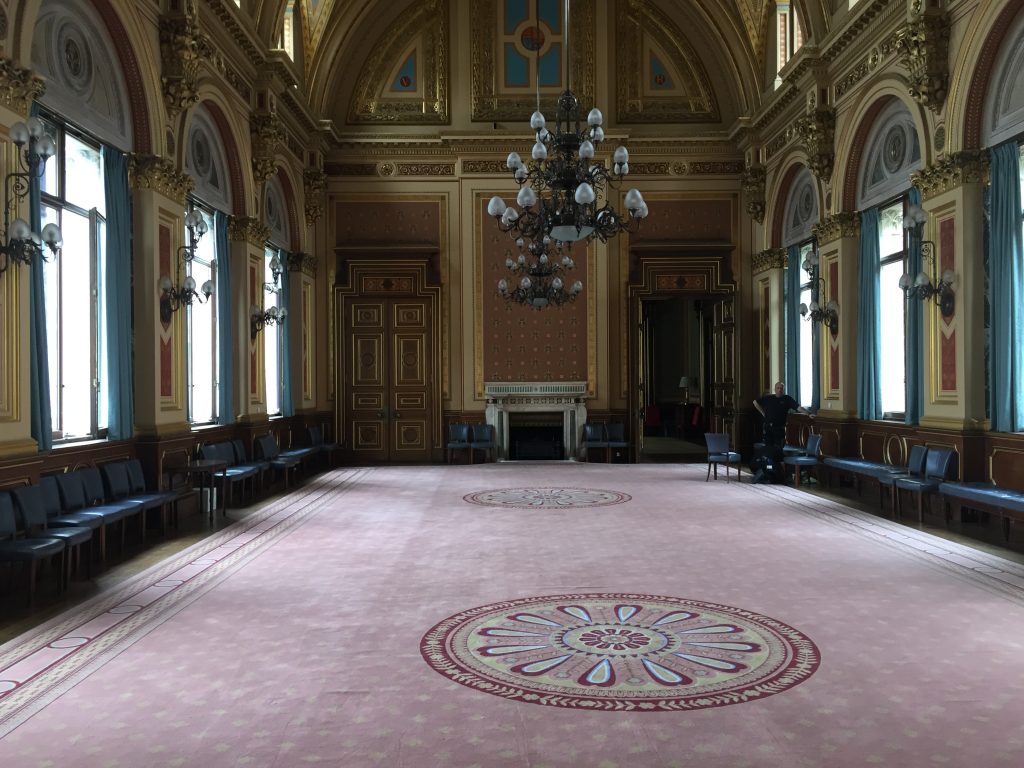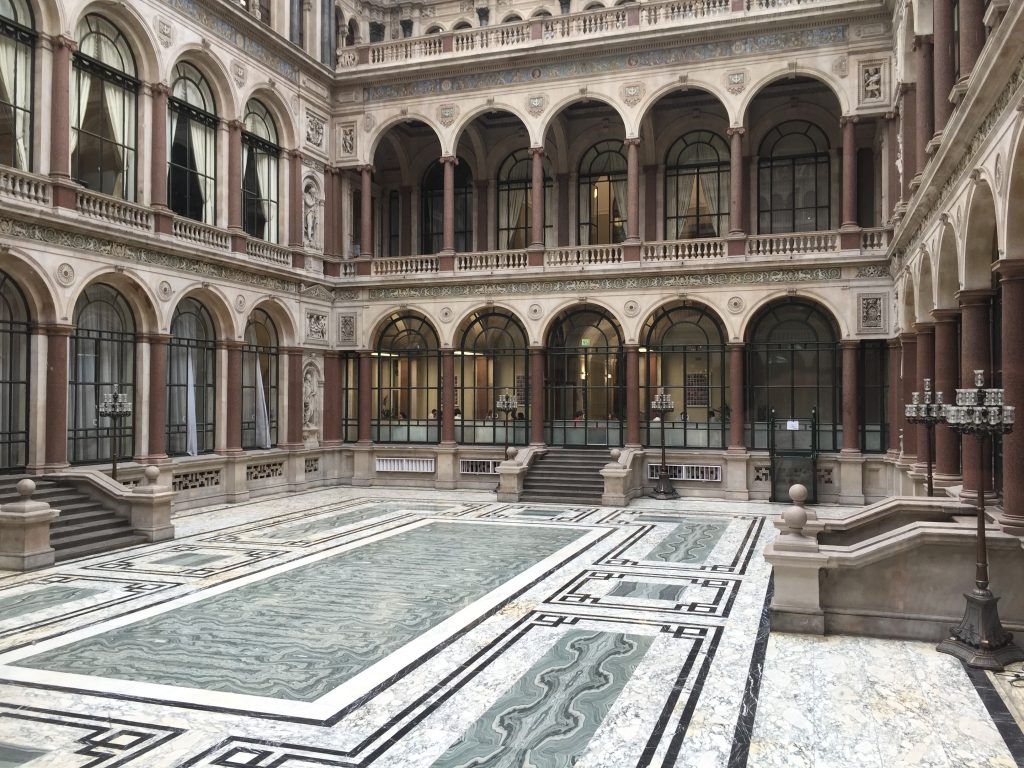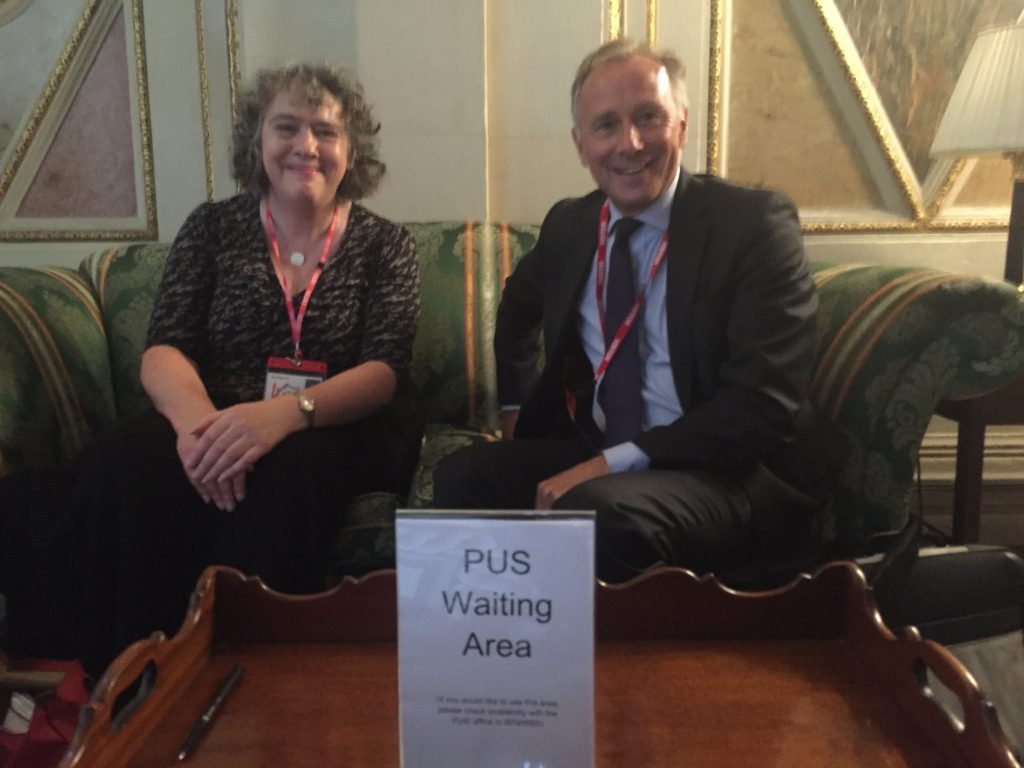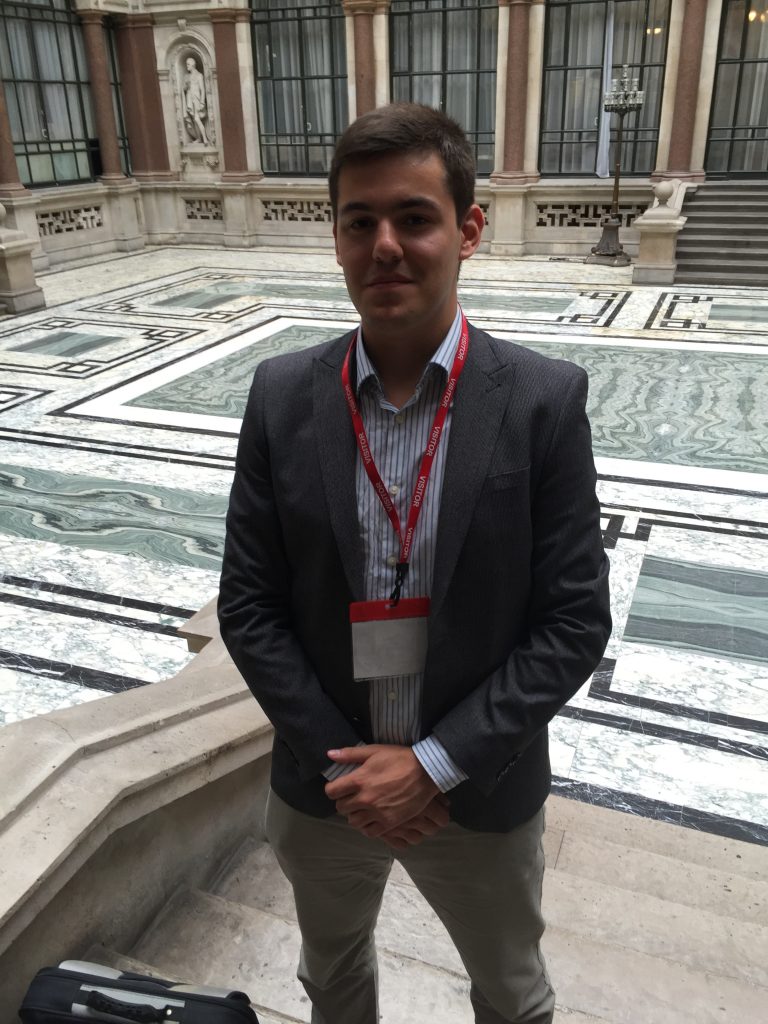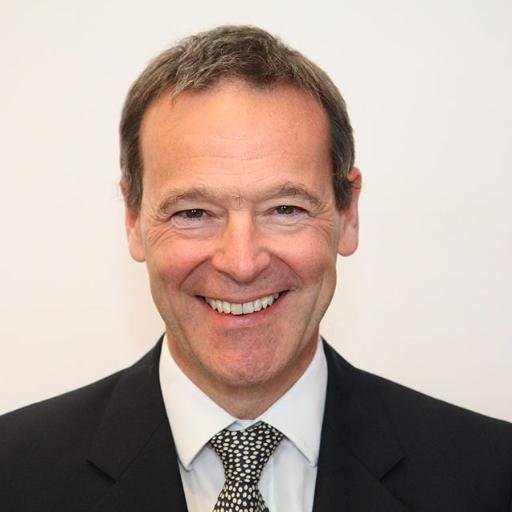On the 2nd August 2016, the ‘Networks and Actors’ team had the great privilege of interviewing Sir Simon McDonald, the Permanent Under-Secretary of the Foreign & Commonwealth Office. It gave us an excellent opportunity to question Sir Simon about the main themes of the project and how some of the issues we had been exploring in our research still impact the Foreign & Commonwealth Office to this very day.
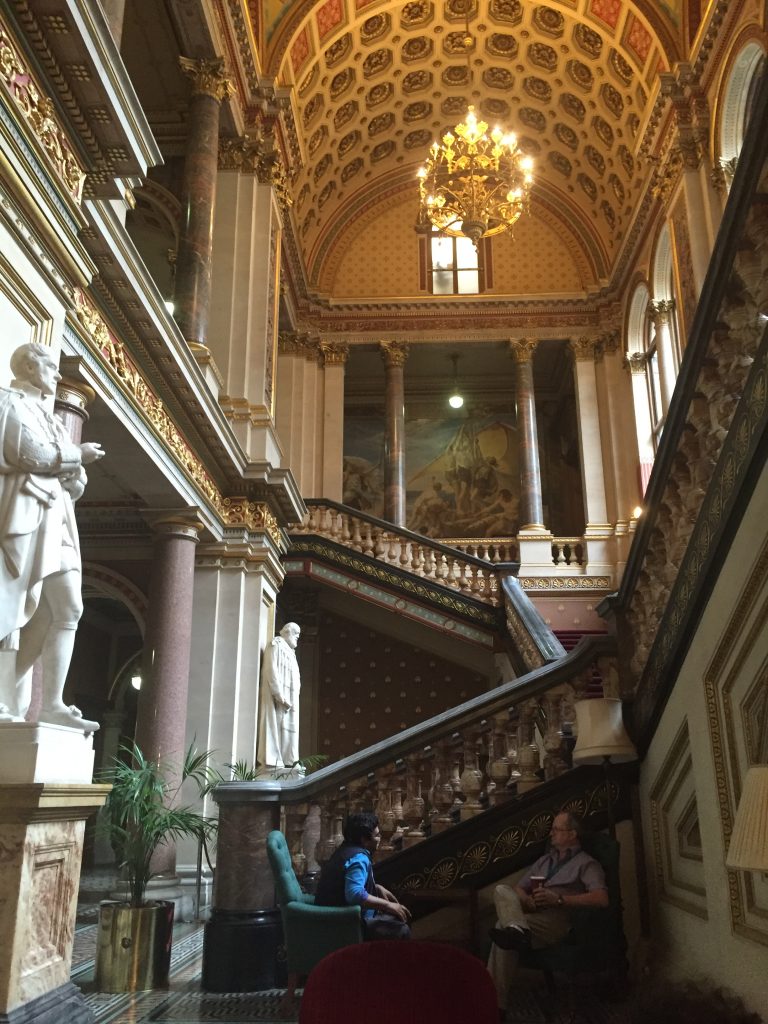
For an audio recording of the interview, please click on the link below:
Recording of Interview with Sir Simon McDonald, 2nd August 2016
Present: Sir Simon McDonald (SM), Professor John Keiger, University of Cambridge (JK), Professor Gaynor Johnson, University of Kent (GJ) and Adam Rolewicz, University of Kent (AR).
Location: Foreign & Commonwealth Office, London.
Date: 2nd August 2016.
Note: Audio recording cuts in during the first question.
JK: When you first joined the Foreign Office, how important was your university background in forming friendships and relationships? Did members of your year group work near to you or close to you within the Foreign Office?
SM: In the Foreign Office then, and I think now, the year group has a very strong group identity. Friendships are, you know, human reactions within that group and I wasn’t aware whether it was Cambridge people or Oxford people, because very quickly you’re more aware of your working environment rather than the academic environment you’ve left, so my best friends were those who worked in the departments closest to me, one of whom happened to be a Sussex University graduate – the exception in our group – and another one was an Oxford graduate. But it’s a watershed moment in your life, I think, joining an institution like this, so this institution rather than what we were bringing was more influential in the friendships that formed.
GJ: Thinking about formative influences – you know you’ve said you’re from Salford – what made you think about a career in the foreign service?
SM: Several things. First of all, the strongest influence academically on me as a child was my history teacher, and I had a really fabulous teacher who was very interested in the influences of remote time on what we do now – he hated contemporary history. The way he brought things apparently from the remote past into present behaviours I found very compelling, and he was very interested in international affairs so that was a very important influence, and the other key influences were my grandfathers. Although I lived in an industrial town, both my grandfathers had worked a lot of their lives overseas, and if you’re a kid growing up in 1960s Salford hearing about West Africa, about the Middle East, about Latin America, this was exciting, even as a small child hearing about places that didn’t stink of tar and weren’t, you know, ingrained with soot. Salford, by the way, now looks very much better, but when I was living there it was a very depressed place. So it sparked my imagination.
JK: We were academics in Salford…
SM: Oh really?
JK: For a certain amount of time [laughs]. Rather a long time.
SM: Another key moment was going to the careers office in my school, and there was a brochure – you know, institutions like this produce brochures for potential entrants – and in a case study there was, I can’t remember the guy’s name, but he was definitely from the North and he’d definitely been to Keele University and he’d gotten into the Foreign Office and his first posting was Afghanistan. And I thought ‘oh’! Something that I associated with upstairs-downstairs Britain was something that someone like me could do and I put it on my list of things I’d like to try. Not only the overseas thing appealed, it’s the career structure thing that appeals. You know, you go in, you work hard, there’s a structure you can rise up which appealed to me personally, and the blocks of time – in a career, to work in three year chunks at home and overseas and then returning to do something different – I just thought it was fantastic. And so it suited me down to the ground, it turns out.
JK: Just as you’ve touched on the second thing we’d like to address as well, which is this sort of distribution of the departments within the Foreign Office, the desks within the Foreign Office. Some obviously are more important than others – how are people allocated to particular desks?
SM: I don’t know how we were allocated at the beginning but we were. What made the biggest difference to how new entrants settled down and had a big influence on how they did was the people around them at the beginning, particularly their head of department. I had the very good fortune to work for a pair of people called Rob Young and Andrew Wood, who were middle-ranking officials in 1982, but one ended up as ambassador in Moscow, the other as High Commissioner in New Delhi. They were the best of their generation and they were immensely helpful as guides and role models and the rest of it, as teachers, and then in my first posting my first ambassador was a man called Patrick Wright who was a great ambassador, and his picture hangs on the wall outside – on the other side of that wall [points] – because he was Permanent Secretary in the late 1980s, so I had a very good run of good people to train me, and I think those that are still in the service had a similarly positive experience early on, and those that left in the first 5-10 years generally had someone in their immediate management chain that they didn’t get on with, or didn’t respect.
JK: But was there a kind of hierarchy of desks according to the politics of the day, perhaps? For instance, let’s say the European desk, was that important?
SM: Well, you see as a new entrant they don’t give you security council negotiations, so it’s a training job and in 1982 we had four days of training and then were thrown into a job, which is a job, but is clearly a training job. Mine was Benelux, so I had interesting things to do but you know, I was not the key person dealing with the Netherlands in 1982 because I had an assistant head of department, a head of department that were watching very carefully what I did, but the subject matter was not too combustible. And all the new entrants had similar training jobs but they were relatively small cogs and how were we placed? I mean, they were all training jobs. The one that everyone wanted was the New York job, because there was a training job that had going to the General Assembly and being one of the people that took the record of what was going on in the debate, and of course because it was going to New York! Everyone wanted to go even though you’d be recording what the Foreign Minister of Gabon had to say in his speech, you know, but sometimes it’s the experience rather than the actual job is what you focus on at the beginning and I think that it’s a special trip.
AR: If I could come in: Foreign Office departments, especially across our period, are constantly chopping, changing, shifting, merging etc. When you first joined, which were the principal departments that dealt with the EEC, and today, the EU, if that makes sense?
SM: Yes, then we had something called ECDE and ECDI, which was European Community Department Internal and European Community Department External. New entrants weren’t let loose near that work because it was important work and it couldn’t shave off something for a beginner. We also had, within Europe, Soviet Department – we’re talking about the early 80s – Western European Department, Southern European Department, and I think Eastern and Central European Department. I was in Western European Department so they all dealt with bilateral relations and so there were new entrants – there were two new entrants in Western European Department and one or two in the Southern Europe Department. So the difficult, technical stuff was in the ECDs and they were older, more experienced desk officers in them, and the bilateral departments were less prestigious, less pressured and more places to put new entrants.
GJ: Another theme of our project is the relationship between – in my period, I work on the interwar period so obviously it’s the Foreign Office but in our period it’s the Foreign and Commonwealth Office – to what extent does it work with other government departments in the sense that if you have a foreign policy issue, at what point would the FCO bring in say, the Treasury or another department?
SM: Well, that has been a very big change in my career because thirty odd years ago the Foreign Office dominated the overseas policy space, working very closely with the MOD and the agencies, the two agencies dealing with ‘out there’ are both subordinate, you know, both report to the Secretary of State, so the Foreign Office sat at the top and of course we didn’t have a separate development assistance ministry, we had the ODA which again reported to the Foreign Secretary, so he was really ‘head honcho’. Now we have a National Security Council, and it has changed a lot. Over the last thirty years, more departments have acquired interests, particularly in Brussels. So DEFRA, and DECC, and the Treasury, and the Home Office frequently have business through Brussels, or have until now, as long as we’re a member of the European Union. And so the Foreign Office has not been holding the ring as clearly in the foreign policy space, and the National Security Council has sort of crystallised that fact. Within the National Security Council, I would argue that the Foreign Office remains the key player, but there’s a bit of central machinery now which wasn’t there before which is very important.
GJ: Because historically, when there’s been a kind of loss of influence in the Foreign Office, there’s understandably been quite a lot of resentment within the Foreign Office itself. Have you found that that’s been the case in the contemporary period…?
SM: Gaynor, we’re very contemporary indeed right now! It’s only been a month since the vote! [laughs].
GJ: Since the referendum. Well, I was going to lead you onto that then if we have time.
SM: There’s jostling in Whitehall, my goodness, there is all the time, but I think the USP of the Foreign Office is that it’s the only department that knows ‘out there’ in any detail. So all kinds of people will want to play in Middle East policy, or Latin America policy, or Russia policy, but the Foreign Office is the one that’s got the people who’ve actually been there, worked there, speak the languages, know it from more than a two-day trip or reading a book or two, and I think when push comes to shove that extra knowledge is vitally important. And what is happening right now – there are three ministries playing in the European space, but we’re the only ones dealing with Russia, and Latin America, and the Middle East and North Africa, so we don’t find it hard to occupy ourselves with stuff that we think is worthwhile.
GJ: What I actually meant was really more a question of if there is a loss of influence or a perceived loss of influence, that can have a detrimental effect on morale in the department and I was just wondering whether you’ve had any experience of that, not necessarily directly but maybe in dealing with your juniors?
SM: I suspect that FCO-types have always looked back to a golden era when the Foreign Secretary ruled the roost, but you talk about loss of morale, and loss of influence – I remember in the 1980s, when Margaret Thatcher was Prime Minister, Geoffrey Howe was her Foreign Secretary. He was a very good and energetic man, but there was a feeling that the really important stuff was being done over the road! But people were presenting that as though it was something new, and I’m pretty sure that Anthony Eden and his crowd had similar feelings when Churchill ruled the world, and you can go back and choose any Foreign Secretary during a time of world crisis and the Prime Minister would have been the person in the lead.
GJ: Yes, I’d agree with that and it’s one of the reasons why, as historians, we obviously know the historical context and it’s interesting to talk to yourself to kind of say well, really, in lots of ways some things have changed but some basic things haven’t.
SM: Some basic things haven’t. But one of the things that has changed is that the United Kingdom is absolutely less powerful than it used to be. A hundred years ago, we were the key power in the world. You know, the First World War wasn’t our most glorious moment necessarily but we were absolutely front and centre, whereas now there are lots of countries that play as big or bigger role on the international stage and that’s down to how our economies have developed over the last hundred years. So there’s a sort of secular loss of national influence because, relatively speaking, the United Kingdom is less important in the world which means we absolutely have less power.
JK: Could we just mention, talk a little bit about what might be called an institutional reflex of particular ministries? Certainly, the media and certain politicians in the French case in the 1920s and 30s and 40s believed that the French Foreign Office had a particular way of negotiating, a way of going about things, and that may or may not be the case, but I’m sure that within the French Foreign Office – there’s lots of evidence to show – that there were very different views about how to deal with a particular issue, and I just wondered, I’m sure that must be the case, or have been the case with the Foreign Office, and how did those views get resolved when they’re very different views about whether we enter into the Briand Plan for a United States of Europe at the end of the 1920s or whether we don’t agree? Those conflicting interests existed within the Quai d’Orsay and they existed within the Foreign Office itself I think, and I wonder how those things get resolved?
SM: I think it is a mistake to think the Foreign Office has a consistent institutional line. I know that that is the reputation, but I think that the Foreign Office has always been very responsive to the government of the day. The Foreign Secretary in particular – Foreign Secretaries set the agenda and the tone of this institution. So it is assumed that the Foreign Office is hopelessly, unquestioningly Europhile, whereas actually I think we’ve been hopelessly – no hopelessly is the wrong word – we’ve been enthusiastically, energetically trying to defend British interests within Europe for the last forty years. People like David Hannay and Nigel Sheinwald and John Kerr would take on their European colleagues in order to advance the British interest; they didn’t think: ‘oh, this is for Europe, therefore we’ll go along with the consensus developed elsewhere’. So that assumption I think is wrong, and the pro-Arabist. There’s a lot more Arabic-speaking countries than Hebrew-speaking countries, and though we’ve had a lot more diplomats serve in the Arab world than in Israel, I don’t think we’re romantically, hopelessly devoted to the Arab cause as opposed to the Israeli cause even though that is our reputation, so I question whether the stereotypes are in fact correct.
JK: Yes, well I don’t think either of us believe in the stereotype, we believe there are different views within the institution itself, and my question is how did those get resolved when it gets nearer the top?
SM: Well a lot comes together around the Foreign Secretary. That’s where final decisions are taken and where direction is set. There were Foreign Secretaries who liked – or were thought to like – having everything boiled down and dealt with before it arrived in their office, so that there was a very clear analysis and policy recommendation for them simply to endorse. More typical, I think, are Foreign Secretaries who like to hear the debates, and so in the Foreign Secretary’s office, generally, but also in writing, there is a way of testing propositions, before finally he – or in only one case she – decides. So there’s quite a lot of debate through the system. Adam?
AR: If I can refer back to a very interesting point you made about the entrance year being quite a strong identity almost – that if you entered this year, friendships and certain relationships were formed etc. To what extent does the Foreign Office perhaps harbour generational shifts in attitudes towards, for example, Europe? In my case the post-war recruits are much more – for obvious reasons, because they fought on the front line, they’ve seen the destruction of the Second World War – they’re much more open to the idea of European integration that some of their senior colleagues. Is there any sense of that towards certain issues in the Foreign Office?
SM: I think there probably is. The world of your teen years is going to be very important as you’re starting your career in your twenties. And the generation ahead of me were definitely more viscerally pro-European. I think myself and my contemporaries grew up in the 1970s, and I remember my personal surprise with the UK taking on Argentina in 1982. All I’d seen in Salford in the 1970s was evidence of previous glory. The idea that we were still a player was not evidenced from what I saw around me in the 1970s North-West. So the 1980s did feel, as a young practitioner, the UK coming back, but from quite a long way behind. Although we were discussing a hundred years ago we were the pre-eminent power, by 1950 we were on our knees. We were completely exhausted after the two World Wars, and it was just the fact that everyone else was quite a long way behind that meant that it took other people a long time to overhaul us because they were so much further behind, but they were dynamic and we didn’t feel dynamic, to me, in the 50s, 60s and 70s.
AR: Thank you. Again, in reference back to personalities which you believe are attracted by a career at the Foreign Office, and the personalities you indeed look for in applicants, can I tie you a bit more to what type of personality? You’ve mentioned curiousness and sharpness. Do you think there is a typical profile?
SM: I think that the best diplomats, and so the ones that we look for in the recruitment process, are those that pick up a brief, assess a situation very quickly, and can make something of it. They are people who have a strong personal impact, and I think they are people who are not easily disconcerted by the unfamiliar or unexpected, because there’s a certain natural confidence I think in most diplomats. They’re able to keep their head maybe, when others – and keep their feet – when others are uncertain, and if you can do that, you can steal a march on a lot of people around you.
